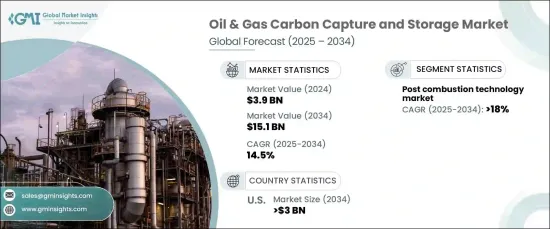
석유 및 가스 탄소 포집 및 저장 세계 시장은 2024년 39억 달러로 평가되며, 2025년부터 2034년까지 14.5%의 CAGR로 성장할 것으로 예상됩니다. 이러한 급격한 성장은 환경 규제 강화와 세계 탄소 중립 목표 달성을 위한 노력의 활성화가 주요 요인으로 작용하고 있습니다. 탄소 회수 기술은 특히 석유 및 가스 부문에서 CO2 배출을 완화하는 데 필수적인 요소로 자리 잡고 있습니다. 기후변화에 대한 우려가 커짐에 따라 더 많은 정부와 조직들이 이러한 목표를 달성하기 위해 지속가능한 기술의 개발 및 도입에 우선순위를 두고 있으며, CCS는 특히 석유 및 가스와 같이 배출량이 많은 산업에서 탄소 배출량을 줄이는 효과적인 수단을 제공합니다.

향후 10년간 이 시장은 비약적으로 성장할 것으로 예상되며, 2034년까지 150억 달러 규모의 시장을 창출할 것으로 예상됩니다. 에너지 수요 증가와 함께 이산화탄소 배출량 감축에 대한 관심이 높아지면서 CCS 기술 채택의 원동력이 될 것으로 예상됩니다. 석유 및 가스 산업의 업스트림 사업과 지속가능한 발전에 대한 수요 증가는 향후 시장 형성에 큰 역할을 할 것으로 예상됩니다. 이들 산업은 CO2 배출의 가장 큰 요인 중 하나이기 때문에 CCS 솔루션의 통합이 더욱 중요해집니다. 이산화탄소 포집 및 저장은 석유 및 가스 채굴 및 생산 공정의 중심이 되고 있으며, 많은 양의 이산화탄소를 배출하는 대규모 탐사 활동을 수반하는 경우가 많습니다. 산소연소, 예비연소, 후연소를 포함한 가장 일반적인 CCS 기술은 천연가스 처리 플랜트, 정유공장, 석유회수증진(EOR) 사업에서 CO2를 회수하기 위해 채택되고 있습니다.
| 시장 범위 | |
|---|---|
| 시작 연도 | 2024년 |
| 예측 연도 | 2025-2034년 |
| 시작 금액 | 39억 달러 |
| 예상 금액 | 151억 달러 |
| CAGR | 14.5% |
이들 CCS 기술 중 연소 후 기술이 가장 높은 성장세를 보이며 2034년까지 연평균 18%의 CAGR을 기록할 것으로 예측됩니다. 포스트 연소는 화석연료 연소시 발생하는 배기가스에서 CO2를 회수하는 것으로, 발전, 정제, 석유화학 산업의 주요 제품별로 구분됩니다. 이 기술은 석유와 가스에 대한 전 세계 수요가 지속적으로 증가함에 따라 배출량 감축을 위한 노력에 있어 빠르게 중요한 역할을 하고 있습니다. 포스트 컨버젼스 기술은 기존 운영을 중단하지 않고도 지속가능성 목표를 달성할 수 있는 실용적인 솔루션을 업계에 제공합니다.
미국에서는 배출 규제 강화와 지속가능한 기술에 대한 투자 증가로 인해 2034년까지 석유 및 가스 탄소 포집 및 저장 시장이 30억 달러에 달할 것으로 예상됩니다. 석유 생산 증대 회수(EOR)와 천연가스 처리에 중점을 두고 있으며, 배출량 감소와 생산량 증가를 동시에 달성할 수 있는 CCS 솔루션이 널리 채택되고 있습니다. 또한, 민관 협력으로 대규모 CCS 프로젝트 개발이 가속화되고 있으며, 미국은 탄소 회수 산업의 세계 리더로서 입지를 공고히 하고 있습니다. 이러한 노력은 전 세계 배출량 감축에 중요한 역할을 하는 동시에 이 분야의 지속적인 성장과 혁신을 촉진할 것으로 기대됩니다.
The Global Oil And Gas Carbon Capture And Storage Market reached USD 3.9 billion in 2024 and is projected to experience a CAGR of 14.5% from 2025 to 2034. This surge is largely driven by tightening environmental regulations and the increasing commitment to achieving global carbon neutrality goals. Carbon capture technology is becoming an indispensable part of mitigating CO2 emissions, especially in the oil and gas sector, one of the largest contributors to greenhouse gas emissions worldwide. As concerns about climate change intensify, more governments and organizations are prioritizing the development and implementation of sustainable technologies to meet these goals. CCS offers an effective means of reducing carbon footprints, particularly in industries with high emissions like oil and gas.

Over the next decade, the market is expected to grow exponentially, with projections estimating that it will generate USD 15 billion by 2034. The increased focus on reducing carbon emissions, along with the growing demand for energy, is expected to be a driving force for the adoption of CCS technologies. Upstream operations in the oil and gas industry, as well as the rising need for sustainable power generation, are expected to play a major role in shaping the market's future. These industries are among the largest contributors to CO2 emissions, making the integration of CCS solutions even more critical. The capture and storage of carbon dioxide are becoming central to oil and gas extraction and production processes, which often involve large-scale exploration activities that generate significant CO2 emissions. The most common CCS technologies, including oxy-fuel combustion, pre-combustion, and post-combustion, are being adopted to capture CO2 from natural gas processing plants, refineries, and enhanced oil recovery (EOR) operations.
| Market Scope | |
|---|---|
| Start Year | 2024 |
| Forecast Year | 2025-2034 |
| Start Value | $3.9 Billion |
| Forecast Value | $15.1 Billion |
| CAGR | 14.5% |
Among these CCS technologies, post-combustion is projected to see the highest growth, with an expected CAGR of 18% through 2034. Post-combustion captures CO2 from flue gases produced during the combustion of fossil fuels, a major byproduct of power generation, refining, and petrochemical industries. This technology is quickly becoming a key player in efforts to reduce emissions as global demand for oil and gas continues to rise. Post-combustion technology offers a practical solution for industries to meet sustainability goals without disrupting existing operations.
In the U.S., the oil and gas carbon capture and storage market is projected to reach USD 3 billion by 2034, driven by stricter emissions regulations and increased investments in sustainable technologies. Significant focus is being placed on enhanced oil recovery (EOR) and natural gas processing, where CCS solutions are being widely adopted to both reduce emissions and enhance production. Moreover, the collaboration between public and private sectors is accelerating the development of large-scale CCS projects, solidifying the U.S. position as a global leader in the carbon capture industry. These initiatives are expected to play a key role in reducing emissions on a global scale while also driving continued growth and innovation within the sector.